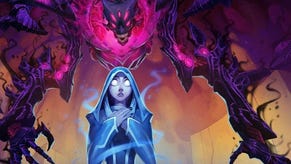WildStar
Craft your own war.
Once, we dreamed of worlds where we could be anyone, do anything. That day may yet come, but in 2011 the grand fantasy of a sandbox MMO is one that is served only by boutique or elder games which determinedly reward the eternal ardour of their existing fans but struggle to add that surface level of gloss and accessibility necessary to draw a gigantic crowd.
There is a reason that World of Warcraft is so successful. There is a reason that BioWare has made large elements of Star Wars: The Old Republic look and play a certain way. There is, similarly, a reason your first reaction to screenshots of WildStar, the major new MMO from NCsoft's Californian studio Carbine, will not be without familiarity. It wants people to come to it, and it seemingly knows some of the ways to make this happen.
Once they're there, though: then it wants to give them something else. It wants to let them play how they want to play - to be a bold middleground between that promise of true freedom and the more treadmill-like reality of traditional MMOs.
WildStar is a game about controlling a fantasy character (though actually, the troubled world of Nexus is one of both magic and high technology, its former rulers the Eldan having departed in mysterious circumstances) from a third-person perspective in an online world full of other players, fighting angry monsters in the hope of experience points and loot, and pressing number keys to activate special attacks.
Yep, tropes are tropes. It's also a game that offers you a theoretically profoundly different experience and even a different vision of itself, depending if you gravitate towards fighting, exploring, collecting or socialising.
You pick one of these four play styles in addition to picking a race - humans, fey, bunny-eared Aurin or towering, glowering mercenaries the Granok - and a class. Maybe you're a blade-wielding Warrior, maybe you're the weapon-enchanting gunman known as a Spellsinger, maybe you're one of the psychic support class called Espers, maybe you're one of the archetypes we don't know about yet. While hopefully these classes will all offer a crazy torrent of monster-bashing in their own right, they're not really why the game hopes to stand apart from its many peers. The play styles are the point.
If you're the kind of MMO player who couldn't give a hoot for world lore, nosing around distant caves or building communities, WildStar reckons you'll want to tread the path of Combat. Pick this one and your character, no matter their race or class, will be able to activate Horde Holdouts scattered across the world.
Basically, doing this provokes an on-the-spot public quest involving swarms of monsters eventually escalating to a boss fight. This means experience, loot and bloodshed, and none of that namby-pamby readin' or boring searchin' stuff. FIGHTFIGHTFIGHT. None of that grind either, in theory, but instead a series of intense battles activated at your behest.
If you're the kind of player who finds beast-bothering plays second fiddle to seeing more of the world and seeking out its hidden places, Carbine have you pegged as an Explorer. Using your Locator, you'll make your way to bits of Nexus that other play styles don't know about and in many cases can't even see. Rewards stem from reaching strange places, such as finding a spatial anomaly which grants you temporary power-jumping or activating a node on an un-climbable rock spire which shows you a secret path up its side.










.png?width=291&height=164&fit=crop&quality=80&format=jpg&auto=webp)




.jpg?width=291&height=164&fit=crop&quality=80&format=jpg&auto=webp)
